Before we move too far into the future, let’s pause a moment to talk about Halloween. Not the spiritual vigil of Samhain or seasonal harvest celebrations. Let’s discuss the wholly secular, American and Canadian holiday of Halloween, complete with candy, costumes and PVC pumpkins.
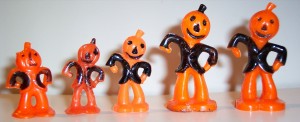
Vintage Plastic Halloween Pumpkin Men by riptheskull
It’s fair to say that Halloween has a somewhat uneasy place in the family of North American holidays. On the one hand, we, as Pagans, fully embrace the festivities. It is the one calendar event that openly clings to its Pagan origins. When else can you buy a pentacle in TJ Maxx? But, on the other hand, the celebration mocks its own spiritual roots, something that we hold very dear.
We aren’t alone in our unsettled attempts to navigate through the Halloween season. American religious and community leaders repeatedly attempt to ban the holiday. Why? The list is endless including concerns over the overindulgence in candy, the potential dangers of trick-or-treating, the increased popularity of over-sexualized or violently graphic costumes and, of course, its Pagan origins. But the majority of folks really just want an excuse to party. Halloween provides a unique canvas that can only be topped by the decadent bacchanalia that is Mardi Gras. (The Atlantic, 10-30-12)
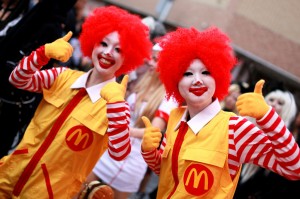
Ronald McDonalds Girls
Photo courtesy of Japan-Talk.com
More recently, the Halloween debate has been getting larger – much larger. Over the past two decades, our secular holiday has been spreading across the globe, seizing the imaginations of youth cultures on every continent. The holiday has hitched a ride with missionaries, English language teachers and ex-pats. It’s being promoted by imported American cultural commodities like internationally-based Theme Parks, McDonald’s stores, Coca Cola products and Hollywood movies. And, of course, the ever-increasing accessibility to the internet only fuels the proverbial fire.
In some regions, Halloween has been readily incorporated into long-established fall cultural traditions. In the U.K. and the Republic of Ireland, Halloween finds itself at its ancestral birthplace. Today, the newly-imported version has mixed with surviving local customs associated with, among others, Guy Fawkes Day. As noted by English writer, Chris Bitcher:
“Trick or treat has now actually become a bona fide tradition in the UK ….Fireworks were our autumnal treat of choice and for a good little while we fought off any competitor to it. But then we gave that up and decided to embrace both.” (Your Canterbury)
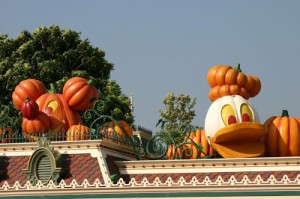
Disneyland Honk Kong
During Halloween
Across the globe in China, Hong Kong and Japan, people have been enthusiastically adopting the holiday. Lisa Morton, award-winning writer of Trick or Treat: The History of Halloween, and noted Halloween authority, attributes this acceptance to the presence of two Disney Theme Parks (Tokyo and Hong Kong), Hollywood horror movies and a fascination with American pop-culture. During my own discussion with her, Lisa added, “In Japan, there is a love of festivals and affection for costuming or “cosplay,” which is associated with anime and manga.” In mainland China, Halloween is slowly replacing Yue Laan or “ Hungry Ghost Festivals,” during which people appease and entertain ancestral ghosts. To fuel and solidify this cultural shift, China will be getting its very own “Haunted Mansion” at Shanghai Disneyland in 2015.
On the contrary, in continental Europe, Halloween has been receiving a less than welcome reception. In Oct 2012, the Polish Archbishop Andzej Dzięga, was quoted on Polskie Radio, as saying, “This kind of fun, tempting children [with] candy, poses the real possibility of great spiritual damage, even destroying spiritual life.” He warned against the “promotion of paganism” and a “culture of death.” In 2003, CNN.com reported that France’s Catholics are trying everything to fend off a Halloween celebration they say is an “ungodly U.S. import.”
More recently, in Russia, the war over Halloween rages on. ABC Online reports that one Russian Education Ministry official called the holiday, a destructive influence “on young people’s morals and mental health.” The Moscow city schools banned Halloween celebrations claiming that they were concerned about, “rituals of Satanically-oriented religious sects and… the promotion of the cult of death.” In the same article, an unamed Russian psychologist warned:
“Halloween poses a great danger to children and their mental health, suggesting it could make young people more likely to commit suicide.”(ABC Online)
Despite this heavily Christian rhetoric, the resistance is not entirely about religion. In our discussion, Lisa explained that, “While it is difficult to fully separate the expression of nationalism from religious tradition, many European countries, like France and Slovenia, have strong anti-American undercurrents.” Religious fervor may, in fact, be serving nationalist interests. Lisa said, in the end, she “believes the protests are far more about nationalism than religion.”
This is expressed in an article by Paul Wood, an Englishman living in Bucharest:
Just as the North American grey squirrel has made the red squirrel almost extinct so has the North American Hallowe’en taken over with extraordinary swiftness, extinguishing older, weaker traditions. This too is life, I suppose, but it is part of the process by which the whole world is becoming plastic. (Romania Insider)
Despite the rejection, Halloween is still growing, albeit very slowly, deep within European youth cultures. In Italy, Halloween is called La Notte delle Streghe or “Night of the Witches.” In Romania, home of the Carpathian Mountains, the local economy is profiting from world’s fascination with Count Dracula. What a better way to spend Halloween than in Transylvania on a “real Dracula Halloween tour” complete with a four-course dinner and prizes!
Now, let’s move into the Southern Hemisphere where Halloween faces a new obstacle. Simply put, the harvest-based holiday does not apply. In this part of the world, October 31st marks the middle of Spring, not Fall. Over the summer, I was reminded of this fact when wishing an Australian friend, “Joyous Lughnasah.” She responded with an equally joyful, “Happy Imbolc.”
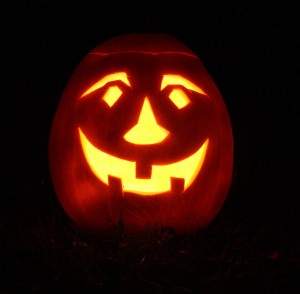 In the Southern Hemisphere, traditional festivals continue to be celebrated in accordance with appropriate seasonal shifts with no noticeable attempt to transplant Halloween to May. However, youth cultures have been showing a small amount of interest in an October-based Halloween celebration, particularly in the English-speaking countries of Australia, South Africa and New Zealand. If for no other reason, the Northern holiday offers a chance to party and dabble in the macabre – even if it’s completely devoid of its seasonal aspects.
In the Southern Hemisphere, traditional festivals continue to be celebrated in accordance with appropriate seasonal shifts with no noticeable attempt to transplant Halloween to May. However, youth cultures have been showing a small amount of interest in an October-based Halloween celebration, particularly in the English-speaking countries of Australia, South Africa and New Zealand. If for no other reason, the Northern holiday offers a chance to party and dabble in the macabre – even if it’s completely devoid of its seasonal aspects.
What about the Americas? As noted above, the countries in the Southern Hemisphere do not recognize Halloween chiefly due to geographical complications. However, the closer you get to the U.S., the more our secular Halloween has influenced local October traditions. In Costa Rica, for example, locals “have taken this “foreign” holiday and used it to revive an ancient Costa Rican custom: Dia de la Mascarada Tradicional Costarricense or Masquerade Day,” reports the Costa Rican News.
Closer to home, in Mexico, the famous and mystical celebration of Dias de los Muertos is, now, often called Dias de las Brujas or “Day of the Witches.” Halloween practices have been woven in to this largely religious holiday. As expected, there has been backlash from Mexican nationalists and religious leaders. However, Mexico is just too close to the U.S. to prevent the blending of two very similar October holidays. And that continues to happen in both directions.
Just as Halloween has infiltrated Mexican culture, elements of Dias de los Muertos are now showing up within U.S. Halloween celebrations. In an interview, Lisa Morton explained:
Last year I saw my first piece of major Dias de los Muertos American retailing – the Russell Stover candy company released several themed candy bars… That’s probably a sign that Dias de los Muertos is starting to be accepted into the American mainstream. It’s certainly very popular in those areas of the U.S. with large Latino populations. More people seem to be joining in large-scale Dias de los Muertos celebrations in America every year.
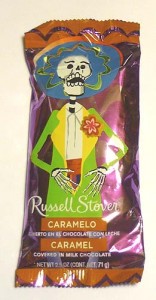
Dias de los Muertos Candy
Photo Courtesy of Lisa Morton
There are some areas of the world in which Halloween has yet to find a home for reasons already listed. These areas include the Islamic Middle East, the heavily Christian areas of sub-Saharan Africa, Israel, India and parts of South East Asia. I’ll go out on a limb and add Antarctica to that list – just to complete the geography lesson.
What does all this mean for Pagans? First of all, in every article for or against Halloween, a discourse emerges surrounding the origins the holiday. In many of these reports, the author includes a reasonable account of Halloween’s Celtic origins and Samhain-based traditions. Modern Pagan language is, unwittingly, hitching a ride on Halloween’s broomstick.
With the growing public interest in Halloween, we may find ourselves more able to openly join in the global conversation and, at the same time, deal with our own reservations. Maybe we should embrace the evolving holiday, “seize the spotlight” and become the stewards of Halloween worldwide? After all, the U.S. media loves interviewing witches in October. Or, we could completely renounce the secular holiday and its derogatory effigies. We could join others in protest with slogans like “We’re a culture. Not a costume.”
Regardless of our personal feelings about the secular celebration, Halloween continues to gain popularity worldwide, year after year. As a result, every October when the veil thins, a brand-new door opens for us providing a unique opportunity for a teachable moment. Now, we can say that both the ancestors and the world are listening.
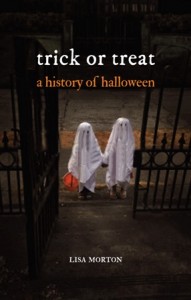
Note about Lisa Morton: Trick or Treat: A History of Halloween. This book is an historical and cultural survay of Halloween’s evolution from early Celtic traditions and lore through the ages and across the globe. It is a good read for history junkies, like myself, or students of comparative culture. Within her detailed work, Lisa did reach out to consult Wiccans, world-wide, and gave a decent nod to the modern-day Pagan spiritual celebrations of Samhain or Halloween.
The Wild Hunt is not responsible for links to external content.
To join a conversation on this post:
Visit our The Wild Hunt subreddit! Point your favorite browser to https://www.reddit.com/r/The_Wild_Hunt_News/, then click “JOIN”. Make sure to click the bell, too, to be notified of new articles posted to our subreddit.
Hey, Jason, have you seen this?
Delta Rae: Dance in the Graveyards
Shot right to the top of my Samhain-season playlist. 🙂
Love it! I want folk to remember me while dancing.
I’m delighted to see Halloween taking root when no indigenous holiday exists at this time of year. Far less so at seeing elements of Halloween absorbed by indigenous holidays that don’t need this intrusion.
I live one county west of Cleveland, and see lots of Dias de los Muertos “Halloween” symbolism — unsurprising in view of the increasing Hispanic share of the local population.
I’ve found Day of the Dead to be tremendously helpful in helping to explain Samhain to outsiders. In the past, when I tried to get into how it’s like Halloween but more, has to do with the wheel of the year etc., their eyes would glaze over. Now I tell them it’s similar to the Hispanic day and that it’s about honoring ancestors. They get it right away and it seems perfectly normal to them then.
Re: Antarctica
Halloween at McMurdo
http://www.polartrec.com/expeditions/antarctic-seafloor-ecology/journals/2010-10-30
Some of those costumes are amazing. What creativity.
I was just about to post this. Beat me to it ; )
Just one small correction: in Italy the night of October 31st is not called “night of the Witches” 🙁 In some part of South Italy, Sicily for example, dead people bring presents to children, in other (north west) there are the coursal or the death parade. It is a night of wonder but no relation to witches 🙁 On the other side there is a strong opposition to Halloween that is seen either as an “imported holiday” that is cancelling the ancient tradition or a “pagan holiday” and a lot of delirious blah blah (it is always tricky to talk about “italian tradition” becuase there are thousand of different traditions)
For a rreference to Notte delle Streghe in Italy (the Marche region), check out http://italymondo.com/blog/halloween-in-italy.
As a matter of fact the quoted post talks about a fair in Corinaldo (Marche). They also have “Miss Strega” (Miss Witch) 😛 Just for the sake of Italian tourism there are a lot of similare event all over Italy http://www.cascinasanteufemia.it/new/index.php?id=15 . Most of them are in summer
“On the contrary, in continental Europe, Halloween has been receiving a less than welcome reception.”
Well, Poland and France do not form the majority ;). In the Netherlands it is becoming more popular; it is not rejected in any way. However, we have our own festivals that include trick and treating: ‘St. Maarten’ and ‘Driekoningen’. Most families celebrate one of the two, and some do both. So Halloween seems a bit superfluous. And than there is the Carnaval, which consist out of playing dress-up as well.
And two weeks after Halloween (and All Souls night) the ‘Sinterklaas’ season kicks off. European countries have there own festivals and it depends on a lot of things (not just conscious rejection or approval) whether Halloween is adopted.
In a similar way, following America, Christmas has become a bigger thing, but it has never been able to replace or even come close to the popularity of Sinterklaas. I guess America just has fewer traditional festivals of their own.
We really only have two of our own, Thanksgiving, in which we first stuff a large bird and then stuff ourselves and watch football, and Fourth of July when we blow things up. We like blowing things up, especially in other countries. it makes us feel all warm and glowy inside. Our other festivals we took from other countries and improved them, then shipped them back. Halloween, for example, was just a boring harvest festival for rural folks doing country bumpkin things and we turned it into mass entertainment, thriving enterprise and general fun.
I wouldn’t necessarily say that traditional late harvest festivals were boring.
I came to the conclusion this year that there are several holidays which all coincide around the period of October 31st through November 1st, and that these holidays are related, but not the same. Whether it’s the secular American Halloween, the Christian Hallows Eve, or Pagan/Celticist Samhain, or some other regional variation, each one is its own entity that -may- have somethings in common. Celebration of one does not necessitate the celebration of another unless, of course, the individual in question wishes it. This conclusion addresses both the Christian points of Halloween being a “pagan” holiday, and Pagan attempts to claim the same. No, sorry. It’s as secular as Christmas is in mainstream Japanese society.
So if some Pagans want to go “We are more than a costume” on these days, good for them. However, it isn’t a viewpoint I share, in any regard.
Paganism is more than a costume. If people want to dress up and have a bit of fun, then that is fine. Doesn’t make them Pagan though.
No, but it might make them pagan with a small ‘p’. I think a lot of festivals testitfy of a natural pagan instinct even when they are not in themselves Pagan festivals.
Does that mean that all people who celebrate Christmas are christian with a small ‘c’?
The difference being that Paganism (Big P or little p) is an inclusionary, big tent, set of beliefs and mindset, whereas Christianity (big C here) is very exclusionary and limiting.
I don’t think Paganism can be compared to Christianity, in all honesty. I don’t even think it can be compared to Abrahamism. Its is just to diverse, even before looking at solitary eclecticism.
Creedalism comes from people mostly, the constraints we put on our beliefs or experiences. I think there is a natural paganism which is the human instinct if left to its own devices, which is what I think Soliwo is speaking about above.
That’s a good one 😉 But no, Christian is a credal religion which makes it impossible to use the term in this way. But I am sure Deists disagree and would state monotheism is our natural state.
Let me give an example. Carnival as celebrated in my country is a Christian festival, yet the dressing up, drinking untill extasy, wearing masks, all that points to a pagan sensibility which arises naturally. I do not believe that Carnival or Christmas/ Sinterklaas has been stolen from the pagans. Some pagan elements may come from the far past (though not usually pre-christian times), but most, if present, are probably spontaneously introduced.
And I think this is really hopeful, because if I am right, paganism is never truly lost. Even if all evidence of ancient pagan cultures disappear, we will turn back to pagan experience. It remains pagan with a small ‘p’ because usually no gods are recognized to be present/ existent apart from the Christian one.
Funnily the whole big ‘P’ and small ‘p’ discussion is rather alien to me, since in my native language all religions are spelled without capital letters. So it would be christianity, christians as well as pagan and pagans. 😉
Various forms of ‘paganism’ (I use the word simply because there isn’t a better one) are credal, be it the Wiccan rede or Hávamál.
Put it like this: I do not celebrate Christmas because I do not follow Christ. As far as I am concerned, anyone that celebrates Christmas tacitly gives their approval to the religion that festival comes from.
The fact that some pagan religions have creeds, doesn’t make them creedal religions in the main.
Personally, I’ve never seen a problem with having a creed, so long as you agree with it yourself and realise that it is not universal.
All my life (b. 1941) I’ve heard of “small-c Christians” and “small-d Democrats” referring to people who follow the principles of one or the other system without being members of a Christian church or the Democratic Party.
The xian ” All Saint’s Day” was originally celebrated in the middle of May . It was moved by the church to take advantage of the Pagan celebration of Samhain.
The main complaint I’ve been reading from non-religious Americans is that Halloween is a traditional children’s holiday that is being taken over by adults. I think there is some merit to this. Although holiday customs always evolve in response to social and economic changes, I am sorry to see the benign neighborhood trick-or-treating of my childhood disappear.
I think that’s conflating two things that I’m not sure have any relationship to each other. Adults have been dressing in costume for Halloween either for work or for answering the door to trick-or-treaters for decades. What’s newer are the all-adult Halloween parties. The disappearing neighborhood trick-or-treating is a different thing, a perception among parents that it’s no longer safe, in part courtesy of urban legend scares about razor blades in candy or drug-doctored candy, in part just changing ideas about kid safety in general (how many kids get to walk home from school any more?). As workplaces, churches, malls and the like started putting on Halloween events for kids, worried parents just shifted to that.
So I don’t think it’s being “taken over by adults”, and I see (at least anecdotally) no evidence that fewer kids are dressing up and enjoying the holiday in some capacity, even if it’s a different one than when we were kids. (Also, some of the things kids did during trick-or-treat night wasn’t as benign. Like egging unpopular kids and ruining their costumes, or vandalizing the homes of unpopular families, two things that were an unpleasant part of Halloween in my town when I was a kid.)
Well, the UK had similar celebrations before the festival ‘returned’ from the States – carving turnips instead of pumpkins, since pumpkins aren’t native to us (I remember doing turnip lanterns as a kid – you rarely saw pumpkins in the 1970s, but I’m damn grateful they’re widely grown now – have you ever tried to hollow out a turnip?). Traditions of young people (i.e. men) roving through the streets demanding treats with menaces is common to most British festivals throughout the last few hundred years, resulting in celebrations being periodically banned. What has changed is that the big
‘return of the dead’ night was May Eve, on the other end of the year, but it does make sense to conflate it with All Soul’s in these misty, dank days and nights.
Someone should write an article or book about all the masquerade holidays in various cultures. The Jewish one is a spring holiday called Purim.
Erm, I’ve always thought *Christianity* was a cult of death–they seem to focus an awful lot of their living-life on the afterlife.
We aren’t the ones hanging symbols of death all over the place, last time I checked.
Yes, a corpse on a stick is a odd symbol for the ‘living god’.
Not to mention that it is somewhat lacking tact. I mean, they believe the guy is going to come back. You really think he is going to want to be reminded of what is likely his more horrifically traumatic memory?
PTSD Jesus? Lol!
That would explain Revelation…
I really hope that collectively pagans (witches, especially) don’t contribute to that “We’re a culture, not a costume” attitude. It’s best to have a sense of humor about oneself, because taking your personal attributes too seriously means greater disappointment in others. I love seeing the green-faced, warted hags, personally. Hilarious.
There is a line, though.
Self depreciating humour is fine, but when the butt of someone else’s ignorant joke? Not quite so much.